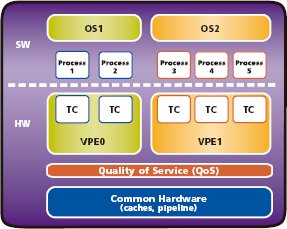Linux BSP aids multithreaded MIPS designs
Aug 1, 2007 — by LinuxDevices Staff — from the LinuxDevices Archive — 39 views Lineo Solutions has introduced an embedded Linux BSP (board support package) aimed at developers of embedded systems and devices incorporating MIPS32 34K RISC processor cores. The new “uLinux Elite” BSP targets MIPS's “Malta” development platform and comes with CodeSourcery development tools, said to support multithreaded functions.
Lineo Solutions has introduced an embedded Linux BSP (board support package) aimed at developers of embedded systems and devices incorporating MIPS32 34K RISC processor cores. The new “uLinux Elite” BSP targets MIPS's “Malta” development platform and comes with CodeSourcery development tools, said to support multithreaded functions.
(Click here for a larger view of the Malta development platform)
Malta platform
The MIPS Malta development platform consists of two modules: an ATX form-factor motherboard that implements CPU-independent functions; and a CPU daughtercard that carries the synthesizable processor core plus a system controller and fast SDRAM. The platform accepts a variety of CPU daughtercards, providing a choice between MIPS32 and MIPS64 cores, and between an FPGA-based synthesizable core and a “lead vehicle,” MIPS says.
Other hardware functions implemented on the Malta ATX board include:
- 64 MB SDRAM
- 4MB boot flash
- 100 Mbps Ethernet
- IDE, serial, parallel, USB, keyboard, mouse ports
- CompactFlash slots
- Audio modem riser connector
- Four PCI slots
- EJTAG v2.5 debug connector
- Onboard YAMON ROM monitor
uLinux Elite BSP
Lineo Solutions says its uLinux Elite BSP for the Malta platform is based on a 2.6.18.8 kernel and includes the following CodeSourcery tools:
- gcc-mips-4.2.0 (Sourcery G++ 4.2.13)
- binutils-mips-2.17.50.20070509 (Sourcery G++ 4.2-13)
- glibc-2.5 (Sourcery G++ 4.2-13)
- updates to Sourcery G++ (“during the contract period”)
Additionally, the BSP is said to include 49 other packages, including busybox-1.4.2-1cs, gdb-6.6.50.20070424-4.2_13cs_mips, and filesystem-2.3.4-1cs.
Lineo claims its uLinux Elite BSP also addresses many of the requirements of embedded and real-time systems. Touted features include:
- 2MB minimum ROM; 2MB minimum RAM
- Kernel XIP (execute in place)
- ulibc (“compactly reorganized glibc”)
- Real-time capabilities:
- hard real-time within Linux kernel space
- POSIX-compliant pthreads support
- power management — supports non-BIOS-based APM interface
- Enhanced support of VFAT format
- IPv4/6 based on IPv6 and various network protocols
- Various device drivers and HotPlug
MIPS32 34K processor core
The MIPS32 34K core family, introduced in February of 2006, was the first MIPS core series to implement the company's “MT” (multi-threading) ASE (application-specific engine), which aims to harness processor cycles that might otherwise be spent idly awaiting memory fetches. The company claims that internal benchmarks have recorded a 60 percent performance increase, with only a 14 percent die size increase. According to MIPS, the 34K provides a 60 percent speedup, dramatic reduction in total cycles, and 20 percent improvement in energy efficiency, using just two threads, compared with a MIPS 24KE core.

MIPS32 34K core usage model
(Click image for further details)
MIPS spokesperson Kazufumi Nakagami stated, “As the MIPS32 34K core is supported by widespread Lineo's embedded Linux, we believe this product promotes and expands development of multithread functions in embedded applications [more] than ever before. The multithread function we released at the beginning of 2006 provides high execution efficiency with low-operating frequency, and non-conventional 'programmability' for increasingly functional-and-complex SoC for embedded systems.”
Availability
The uLinux EliteBSP is available now, priced at an annual fee at 1,600,000 Yen, tax included (approx. $13,430). System requirements include Fedora Core 4/6, and a PC with a 2GHz or faster Pentium 4 or better processor, 256MB of RAM, and 2GB of free hard drive space (10GB recommended).
This article was originally published on LinuxDevices.com and has been donated to the open source community by QuinStreet Inc. Please visit LinuxToday.com for up-to-date news and articles about Linux and open source.